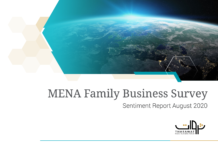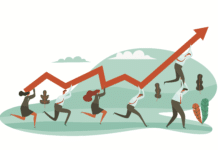Interview with Prof. Viktor Mayer-Schoenberger, Professor of Internet Governance and Regulation at the Oxford Internet Institute at Oxford University
Every generation faces a technological trend or breakthrough that revolutionises business, even if we can’t always entirely predict how. In the 1970’s and 80’s, computers were breaking out from their confines of tech-heavy industries into every aspect of modern commerce. Twenty years later mobile phones and the internet would completely change the way business was conducted, proving wrong those who initially thought they were nothing more than passing fads. Today, big data will overturn the business-as-usual applecart despite the fact that many CEO’s and thought leaders have yet to grasp and embrace its full potential.
So, what is big data and why is it poised to almost certainly reinvent capitalism as we know it? Perhaps nobody is better suited to answer those questions than the man who wrote the book on the subjects. Viktor Mayer-Schoenberger is the author of Big Data and Reinventing Capitalism, two of his eight works on this topic. He is a Professor of Internet Governance and Regulation at the Oxford Internet Institute at Oxford University.
Mayer-Schoenberger grew up in Austria where he founded his first tech start-up, Ikarus Software in 1986. Ikarus focussed on data security and developed the Virus Utilities, which became a best-selling Austrian software product. He was voted Top-5 Software Entrepreneur in Austria and has chaired the Rueschlikon Conference on Information Policy in the New Economy, which brings together leading strategists and decision-makers of the new economy.
Tharawat Magazine had the opportunity to speak to Mayer-Schoenberger to discuss the origins and growth of big data, why humans are predisposed to be reluctant to embrace change, and how big data will transform the role of the traditional firm.
When did the big data concept penetrate private business decision-making for the first time?
It started to become incredibly useful as a profit engine relatively early on. But only to those who understood it. Which mainly meant one company – Google.
Google has always understood the power of data and they reuse it for different purposes all the time.
So, in a way, in the early 2000s big data started to look like a very profitable proposition. But if you ask, “When did it become something that businesses really thought they couldn’t do without?” I think we’ve only seen that over the last three, maybe four years.
The challenge remains in bringing big data analytics from the ivory tower of the Google-type companies, down to something that is tangible to us. And I think that is the hardest part. In fact, if as a business you’re doing well in the old system, it’s really challenging for you to do well in the new system. Because the conventional thinking is so ingrained, and there isn’t enough need for change. It reminds me of the famous quip by one of the earliest venture capitalists, Mr. Kleiner of Kleiner Perkins, who said, “It’s hard to see the picture when you’re part of the frame.”
How can big data create a competitive advantage for businesses?
The most important thing is to understand that big data is not about doing what businesses are already doing, only just faster or more efficiently, or more cost-effectively. Big data really provides a new perspective on reality. A better understanding of the world. And that means better decision making, which in turn is the fuel of success for businesses.
I’ll give you an example: Lufthansa Airlines has a couple of hundred planes flying around the world every day. Every day numerous sensors on these planes collect high volumes of data about the weather. Once the airplanes land that weather data is sent to the German weather service. This additional weather data of those airplanes flying for Lufthansa improved weather forecasts in Germany by seven percent. That’s the largest step change in the recent history of weather forecasting. That data was just available to Lufthansa and the decision to share it made all the difference. And of course, Lufthansa is profiting from it. Because they are getting better weather forecasts which is incredibly important when running a large airline business.
How do you account for the psychological resistance that we’re facing against the application of big data in business?
It has to do with how we understand the world. We are used to a physical world, where if you sit on a chair, I can’t sit on that same chair. There is exclusivity of use built into the physical notion of a chair. But for information that doesn’t hold the same way. You can use information and I can use that same information. And whether or not I make use of that information is often independent of the value that you get out of it.
Our physicality, our physical nature, makes it hard for us to understand that there could be something that is valuable and not exclusive. Therefore, we are viscerally disposed against sharing.
In the data context, of course, not sharing is the stupidest thing, because data’s value lies in utilizing it. There are lots and lots of large companies that have lots of data. But they often don’t know what to do with it. If they can’t use data themselves, then they need to find somebody who can do it and share the data with that somebody. Even if that means sharing the profits, as well. After all, getting half the profit is better than gaining nothing at all.
So, you’re saying it’s built into our DNA to resist big data?
Ever since Kahneman & Tversky’s seminal work in the 1970’s in behavioural economics, we know that humans are not particularly rational decision makers. We have all kinds of biases and cognitive distortions, and therefore, we really shouldn’t trust our gut feeling alone. But, of course, focusing on data means that we are implicitly devaluing the superiority of humanity. We humans are not so special anymore.
In a way big data is a tool for clarity. Because since the industrial revolution 120 years ago, we have known we can’t lift things faster than a machine. For 50 years we’ve known we can’t compute pi faster than a computer. Now we are discovering that we can’t rationally decide better than a machine learning system using a lot of data. But, that means we should actually focus on the things that we are really good at. Like creativity, or originality. Like seeing the world radically different from what it currently is. Things that computers are having a really hard time doing.

We’ve already seen examples where big data has had macroeconomic implications. What are the major economic shifts we can expect?
The most obvious answer and the least satisfying one is that it disrupts the current order. But we need to drill deeper. When we consider so-called superstar firms, a lot of people look at Amazon and say, “Wow, they are so successful.” But I look at Amazon and say, “Yeah of course, they are so successful. Because they run a marketplace.” And not only do they run a marketplace but in the marketplace, they make it very easy to get rich information about what’s available, by whom and for whom on the marketplace.
In offline markets, we can’t easily communicate our preferences to everyone else. So, what did we do? We condensed our preferences and knowledge into price. But that way a lot of details are lost.
Now, on Amazon, I know far more than just a price. I have lots of diverse information. And through the recommendation engine, I basically have a decision assistant. I have somebody who seemingly works for me and tells me what would match my preferences pretty well. These types of markets work far better than traditional money-based markets because they are data-driven. They are data-rich markets, as we call them.
Macro-economically, what this means is that if we have growing data-rich markets, they will help people coordinate activities far better than before. So, more and more transactions will happen in data-rich markets. That’s why Amazon is getting bigger and bigger. Not because it’s a huge hierarchical organization, but because it’s a huge marketplace that offers rich data to drive people’s decisions. In a way, the age of the traditional firm is over. The age of the data-rich market has come.
What industries do you believe could be impacted most by the systematic use of big data?
From a macroeconomic viewpoint, I believe the financial institutions stand to be the biggest loser in all of this. Today, money has two functions: One is to store value and a means of payment. The other is that, through price, money informs us of the value of goods and services on the traditional market. But, if that latter function is greatly diminished money will only be a store of value. Such payment is an infrastructure function. You don’t make much money out of that as a financial institution. For conventional banks and financial institutions bad times lie ahead.
And users are begin to understand this. If I ask my students about the massive data Google collects they say, “Yes, but in return, I get a free email account that is really useful,” When I ask my students, “So, what then doesn’t work well?” they say, “Banks because for years I’ve supplied all of the information about my transaction to them through electronic banking. They have all the data, and I don’t get anything in return.” Now there is a fintech company in London that offers you a free bank account if you are a freelancer. And it automatically calculates whenever money is coming in or goes out of your account how much tax it adds. That is the future.
[ms-protect-content id=”4069,4129″]
What will drive the growth of the big data industry?
I see growth everywhere there is no regulatory hurdle to stifle it. There is a coin-op coffee machine producer. The machines are on factory floors around the world and connected to the Internet for maintenance purposes. The company sees how many coffees are sold every day and they know, therefore, the utilization of the factory. The opportunities are endless.
The big data age is all about using data to ask questions, rather than to answer them.
Here’s another example: There is an app on your smartphone that you can download called Duolingo which allows you to learn a foreign language. Duolingo took the data of all the tens of millions of people interacting with the app, and by looking at surprising data patterns discovered that Spanish speakers learn English the wrong way: When a particular lesson comes up, a disproportionate number of Spanish speakers give up on learning English. When they changed that lesson in the course sequence, the success rate of the English course for Spanish speakers went way up.
Now, the real question is why did none of the conventional language schools come up with this insight? The answer is because all the established players in the field only use the data to answer questions they already have. None of them were open to letting the data raise more questions.
So does it all boil down to agility and openness of mind?
Absolutely, but keep in mind, this represents an opportunity for family businesses compared to large corporations. Large corporations have standard operating procedures. They have the rule book. A family business is much more flexible, adaptable, nimble, and agile. And that’s precisely what we need here. We need the humility, but also the nimbleness, the swiftness, the agility. Because data is all about trying things out, learning iteratively. This is something that is deeply built into a lot of family business’ DNA. And I think that’s precisely what will mean success in their future.
[/ms-protect-content]














